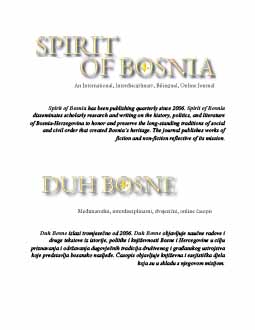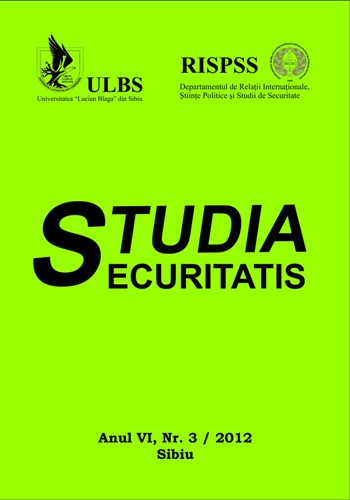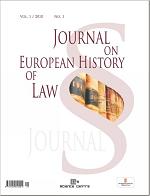





Keywords: Terrorism; ethics; Islam; Democracy; jihad; freedom fighter; fundamentalism
Terrorism started, with organizations like Al-Qaeda, to cross the borders of the states in which they fought their war and made the people from all over the world to fell insecure and threatened by terrorist attacks. The global war on terror which the United States and it’s allies began, especially the methods they used, regarding the prisoners was put into question by human rights organizations and world media. We participated and are still taking part in the global war against terror. We generally see those who fight for their own causes as being terrorists but the question that emerges is “Are they really terrorists?” The answer is hard to discover but we must take into account that these people in the opinion of the masses which support them are the freedom fighters to whom they can look up to and can realize their dreams of independence, social justice or whatever goal their fighting for. Somehow in this war we must find a way to cover the gap between the lack of ethics on the side of the terrorists and on our side because the methods that the democracies are forced to use against them can sometimes lead to disaster. So is their a line we can draw between a just ethics of terrorism or not? Can we still make the difference between the just ethics of Islam and the ethics of fundamentalists? Should we view Muslims as potential terrorists?
More...
Keywords: Think-tank; China; security; defense; strategies
The rise of China to superpower status with the Cold War end has placed Chinese security interests at the forefront of global policy. For military analyst, the fundamental level of explaination is the armed forces - impressive by number and technical equipment. For security analyst, fundamental theme is found into the analysis of economic and political support behind the Chinese military power. But little has been addressed the relationship between centers of strategic and security thinking (think-tanks) and Chinese security policies. What is the mission, structure and material and intellectual capacity of these think-tanks? What is their institutional subordination, and how much freedom of thought can say in an authoritarian political system? What is their influential capacity on policy makers and how much of their security policy proposals become reality? These questions were formulated and for them try this articole to get some answers.
More...
Keywords: Recenzie
Recenzie
More...
Keywords: European Union; unity in diversity; reform of the European Union; European symbols; religious division; ecumenism; education.
In the context of economic, ethnic or linguistic, even religious diversity, nowadays, Europe aims at an unprecedented political and economic unity. European Union, as a symbol ofEuropean unity for the entire continent, at least as widely accepted paradigm, is today not only a political and economic reality, but also a legal one, based however on significant cultural diversity. Europe was and still remains the symbol of unity in diversity, a community of civilizations and balance, but also a community of religious and cultural division. Undoubtedly, beyond the approaches that are rarely based on clear semantic definitions and concepts or precise determination of reality, multiculturalism and interculturalism are obvious realities of European Union, both as given and attitude. Moreover, we may add as particular approach, the idea of cultural identity and cultural otherness, the best definition of the ideal of European unity, as a unique space of civilization, yet extremely diverse and understood by all citizens who feel to be European, even during global economic crisis such as the one in the last three years. This is why the education in the spirit of general European values, but also in the spirit of multiculturalism as fundament of European space must be an ideal, a goal for the Romanian educational system.
More...
Keywords: National security; corruption; vulnerability; risk
The integration and the liberalization of the borders have brought new sources of menace on security among which corruption and organized crime are prominent. Corruption manifests itself and influences in a negative way the security of the state. Corruption encourages the risk factors, while these risk factors encourages corruption. The link between corruption and organized crime have weaked the institutions of the state of law up to dissolution. Corruption has manifested itself at the political, economic, social and cultural level in all great empires; it hasn’t been conceived by the Romanians. In Romania corruption was manifested in all ages with variable intensity. Corruption has economic, institutional, political, social and moral causes. After 1989, in Romania corruption acts intensified and affected all fields of activity: economic, social, political, administrative. The massive privatization of the Romanian economy was the most important source of corruption. Corruption degradates public property, limits access to investments, affects consume, markets, production and has negative effects on the welfare of the population, the state institutions and economic agents. The phenomenon of corruption amplifies the vulnerabilities and the risk factors from the point of view on national security.
More...
Keywords: The Great Depression; American-Soviet inter-war relations; Russian espionage in U.S.A. through Jews; Russian inter-war diversion in Romania
The article presents another perspective about the Great Depression and the American-Russian inter-war relations. It is told about important declarations which show that the stock market crash of October 29, 1929, known as Black Tuesday, was provoked by the most important bankers on Wall Street. It is explained an important reason why Soviet Union didn’t suffer because of the Great depression. It is told about The Martens Office, a Soviet espionage office in New York, in World Tower Building, where worked Genrich Grigorevici Iagoda and about his very important political achievements. There are also presented aspects about the Soviet interference in Rumanian popular revolts of this period.
More...
Keywords: The Mechanism for Cooperation and Verification; EU Anti-corruption Report; European Union; Romania.
Romania’s Adherence in the fifth European Union integration wave in 2007, was done in an atypical way considering the legal frame specific to the adherence Treaty but also considering the other former integration waves. Thus, although the adherence mechanism defined by the adherence Treaty, permitted using the safeguard provisions and the transitory measures till the becoming effective of the integration entrance, it was launched the cooperation and verification mechanism, an institution dedicated to the extended aquis implementation and subjective over the procedures. The Romanian reality as well as the financial-economical crisis reality that came over European Union brings to the light the need for perfectioning, of intervention for correcting the deviations, and for overpassing the system’s crisis and not only. Starting 2013, an extended „EU Anti-corruption Report” mechanism will offer a correcting oportunity for the subjective interpretations of some political parties of some member states and not only, by abating the „Mechanism for Cooperation and Verification” and applying for Romania also, as a member state of the European Union of the mechanism regarding the anti-corruption.
More...
Keywords: Public diplomacy; smart power; American foreign policy.
This article provides an historical reflection on the central purpose of U.S. public diplomacy such national security instrument and demonstrates that U.S. public diplomacy has been principally an ad hoc instrument of American foreign policy to meet wartime exigencies and has been underscored by the promotion of American values of democracy and freedom. Over the years, it has expanded to encompass multiple modes of engagement, while at the same time there has been constant tension concerning the role of public diplomacy as a strategic, policy function versus merely as a "mouthpiece" within the foreign affairs apparatus. All of these themes continue to reverberate in the contemporary practice of American public diplomacy.
More...
Keywords: Russia; sovereign democracy; liberal democracy; security; dictatorial regime; great power.
After the disintegration of the Soviet Union, in December 1991, the democracy has developed slowly in Russia. Vladimir Putin made permanent the sovereign democracy, removing Russia from liberal democracy in the near future. It is known that the states that are considered advanced democracies have abolished war between them. There are some specialists in the study of democracy who are concerned about political developments in Russia and they ask if Russia can follow a trail to a dictatorial regime. The Western states look carefully to political developments in Russia, considering that moving towards a dictatorship would decisively influence to overall security environment.
More...
Keywords: Social innovation; social entrepreneurship; Europe 2020; financial crisis.
Rising unemployment, increasing poverty, more marginalized young people and a growing number of senior citizens – these are just some of the social challenges that the European Union will be facing in the future, challenges that have been hardly aggravated by the current economic crisis. In this context, the promotion of social innovation and social entrepreneurship seems to be a new and effective way to address these problems. Not through a reduction in public tasks and core services, but through new frameworks and solutions that mobilize already existing resources in the local communities. This article first provides an overview of the problems the European Union is currently confronting with as a consequence of the economic crisis. Secondly, it frames the discussion about the changes and perspectives of social innovation around the core political initiatives brought about the European Commission to reform the European Social Model. Nonetheless, it stresses the importance of the Europe 2020 strategy and the need to forcefully implement it including through more social investment, social innovation and social economy.
More...
Keywords: Republic of Montenegro; National Security Agency; transition; moral; ethics; crime.
Telling truth is deeply rooted in many cultures and religions in the world. It is also an essential dimension of democratic way of governing. If the ultimate purpose of intelligence product is presenting the truth to political key people, an integrity and objectivity are the most important characteristics of an intelligence professional beside bravery to present the truth, even when it is undersirable. This bravery is, certainly, especially necessary in absolutistic and dictatorship systems, where the truth can cost an intelligence officer his life, freedom of, in a best-case scenario, a career
More...
Keywords: Moldovian SSR; SMERH; NKVD; Counter Information; repression.
On April, 1943, after the reorganization of the Soviet Intelligence and Security Services was created the SMERSH Counter Information and repression organs in the Soviet Army, Soviet Military Maritime Fleet and the organs of the Internal Affairs. At the end of March 1944, the soviet troops reoccupied Northern Bukovina and till August 23, 1944, as a result of capitulation of Romania, the rest of Bessarabian territory was reconquered. At the same time with the Soviet Army operative units the security structures came back to Bessarabia. The firstly arrived structure was SMERSH organs of the military units and the SMERSH Counter Information Office of the Moldavian SSR NKVD which was represented by the SMERSH offices of the NKVD departments from Bălţi, Bender (Tighina), Cahul, Chişinău, Soroca, Orhei districts and the Tiraspol city department. The basic mission of the SMERSH Counter Information Office of the Moldavian SSR NKVD was to eliminate the hostile elements from the Internal Affairs Organs. The mission was difficult because the majority of the staff was recruited from that territory which was under “ocuppation”.
More...
Keywords: Citizenship; public law; Hungarian constitutional history; legitimization; naturalization; marriage; concept of citizenship; loss of citizenship; private law; foreign citizens; family law; illegitimate child.
The bourgeois transformation created the conditions subsequent to which the demand for statutory regulation of Hungarian citizenship could emerge. The codification of citizenship law was helped by the appearance of the idea of sovereignty and of the principle of equality before the law. The development of a bourgeois state organisation striving to rid itself from the vestiges of feudalism made the reform of citizenship law, as one of the elements of state sovereignty, unavoidable. The bourgeois transformation played a major role not only in the extension of the principle of equality before the law, but also in changing the meaning and the content of the concept of citizenship. Citizenship was an expression of the legal relationship existing under public law between a state and its citizen. In the public law of feudalism, this concept did not exist. As a result of this process, citizenship law also became a part of public law in Hungary (act L of 1879), despite the fact that certain elements of private law continued to play a role in case of both the acquisition and the loss of citizenship.
More...
Keywords: Dogma; legal history; medieval ius commune; Russian legal science; Roman law; Pandectists; civil law theory; argument; methodology; legal terminology
The paper presents the analysis of correlation between the legal dogma and legal history as it was reflected in the theoretical publications of several renowned Russian Private Law scholars throughout the 20th century. The author states that historical argument may, and should, perform the explanatory and corrective functions in relation to legal dogma, but de facto it serves as an ornament in Russian Private Law studies. The author traces the causes of this discrepancy between the desired and actual state of the legal discipline by examining colloquial, philosophical and legal meanings of “dogma” in Russia; European ancient and medieval origins of the legal dogma; and its link with the modern Roman law. The author argues in favour of a more active usage of Legal History in order to correct the inherent drawbacks of dogmatic approach to legal research.
More...
Keywords: Krakow; Poland; local administration
This article includes the overview of political system and functioning of the local administration in Poland in the years 1944-1950, as well as the problems of clerical (officials) law after World War II. On the background of these general statements the article shows selected issues concerning the activity of Krakow County, dealing in the vast majority with the employed officials. In accordance with the above scheme, the article is divided into three equivalent parts.
More...
Keywords: Römisches Recht; justinianisches Recht; Eid; Bibel
Die heidnischen Römer maßen, ähnlich wie andere Völker der Antike, dem Eid eine große Bedeutung bei. Diese wichtige Rolle der Eidablegung blieb auch nach dem Sieg des Christentums, sowohl im privaten als auch im öffentlichen Bereich, bestehen. Der Akt des Eides erhielt nun einen christlichen Inhalt, der in der Anwendung der Bibel seinen formalen Ausdruck fand. Die Konstitutionen von Kaiser Justinian liefern viele Hinweise auf die Anwendung des auf die Bibel abgelegten Eides. Aus diesen Erlassen geht klar hervor, dass dieser symbolische Rechtsakt, der trotz seiner christlichen Form, in vielerlei Hinsicht weiterhin Ähnlichkeit zu den alten heidnischen Eidesformeln aufwies, breite Anwendung fand.
More...